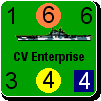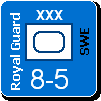brian brian
Posts: 3191
Joined: 11/16/2005
Status: offline

|
1940 land combat results have a significant impact on each game because counter densities are still low. This is most true for Italy, then Japan, but also Germany at times. And if any Allies are the gambling type (not wise).
Over the course of a game, the dice will trend towards average for each and every power. But they will do so more quickly on 2d10 rolls with bell curve results than on 1d10 with linear results, where 2-3 good or bad results sequentially are more of a possibility than with 2d10.
Some good luck on combat dice in China will certainly see a higher 'high water mark' for Japan in China, as a couple bad combat rolls early on will result in fewer gains. Land combat dice results across the first 6 turns could probably be correlated with hex row reached on the map, across hundreds of games.
In this game, Japan has invested heavily in the ground war in China, both by building a MECH for it and also via plentiful infantry class builds, with yet little investment in air or naval assets. They have also committed their strategic reserves (Marines) ever more deeply in to China, and these decisions have reaped rewards. The MECH is a decently efficient aid on each turn's roll on the Partisan table, too.
Japan has naturally had lots of Ground Strike rolls miss. But they had a key pair of them hit before a key land combat where they 'rolled well' on a medium odds attack. Reading through the whole AAR, I wouldn't say they have been abnormally lucky, but have been lucky at a few key points.
But in each game, China also makes decisions on Risk vs. Reward. Twice, early on, the Chinese selected the Assault table when they could have afforded a Retreat result on the Blitz table, both for their units surviving and in terms of being able to afford to lose the ground in question, with plenty more behind them (they can not pick the Blitz table when a hex like Chungking is attacked). If they get lucky on that decision, Japan is stopped for the turn in a given area, usually, but that is usually more on the unlikely side. These are gambles, and the Chinese lost those gambles twice, losing their best Nationalist units in the process while the Force Pools are likely going to yield up Chinese Communist units (losing the 4 & 5 point Natl. units in turn accelerates the Japanese advance vs the now weaker Natl. units). The ChiComms did take the Blitz table once, and this paid off for them, iirc.
|
 Printable Version
Printable Version


























 New Messages
New Messages No New Messages
No New Messages Hot Topic w/ New Messages
Hot Topic w/ New Messages Hot Topic w/o New Messages
Hot Topic w/o New Messages Locked w/ New Messages
Locked w/ New Messages Locked w/o New Messages
Locked w/o New Messages Post New Thread
Post New Thread